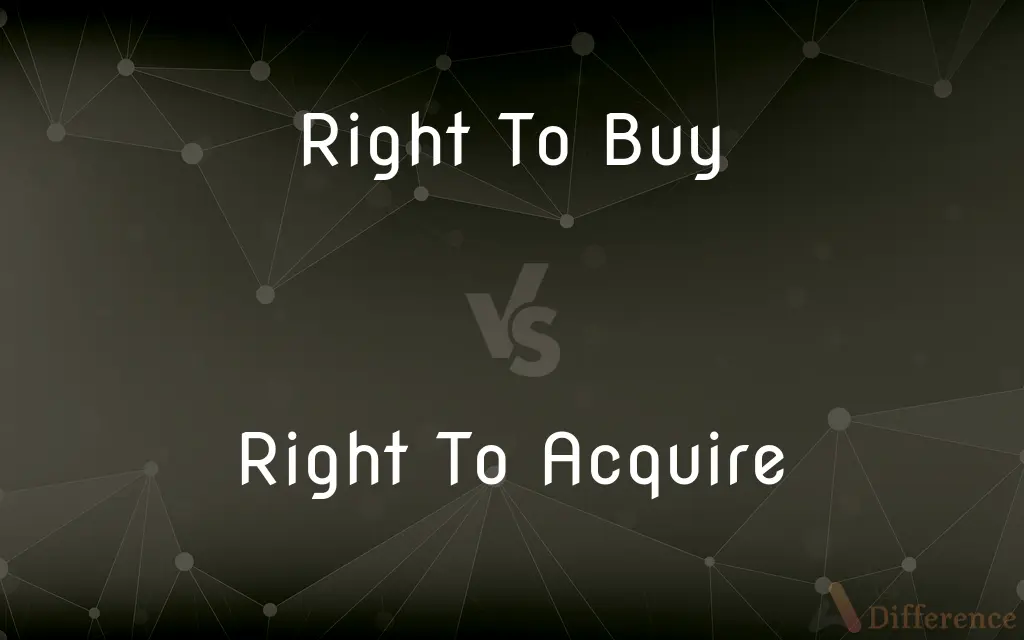Right To Buy vs. Right To Acquire — What's the Difference?
By Urooj Arif & Fiza Rafique — Published on October 14, 2024
Right to Buy allows public housing tenants to purchase their homes at a discount, whereas Right to Acquire offers a similar option for housing association tenants but with different eligibility and discount rates.

Difference Between Right To Buy and Right To Acquire
Table of Contents
ADVERTISEMENT
Key Differences
Right to Buy is a policy designed to enable tenants living in public or council housing to purchase their homes at a discounted rate, depending on the length of their tenancy and other factors. This scheme aims to encourage homeownership by providing a significant financial incentive to long-standing tenants. On the other hand, Right to Acquire is a similar scheme but is specifically tailored for tenants of housing association properties. While it also offers a route to homeownership through discounted purchase prices, the eligibility criteria, discount levels, and applicable properties might differ from those in the Right to Buy scheme.
The discounts offered under Right to Buy can be substantial, often based on factors such as the length of tenancy, the type of property, and its location. These discounts are designed to recognize the tenant's investment in their home and community over the years. Whereas, under Right to Acquire, the discounts are generally fixed and can vary depending on the region, but they tend to be lower than those offered by Right to Buy. This reflects the different funding and operational structures of housing associations compared to local council housing.
Eligibility criteria for Right to Buy typically include a minimum period of tenancy under a public sector landlord, which could be a local council, a non-charitable housing association, or other bodies. Tenants must also be living in the property as their only or main home. In contrast, Right to Acquire eligibility also requires a qualifying period of tenancy, but this scheme is exclusive to housing association tenants. Additionally, the property in question must have been built or acquired by the housing association after a certain date, using specific types of public funding.
One of the significant differences between the two schemes is the range of properties eligible. Right to Buy applies to a broader range of council-owned properties, including houses and flats. On the other hand, Right to Acquire is limited to properties owned by housing associations, and not all such properties are eligible; for example, those deemed necessary for public service provision may be exempt.
While both schemes aim to facilitate homeownership among tenants, the impact on the social housing stock can vary. Right to Buy has led to a substantial reduction in council housing available for rent, prompting discussions about the long-term sustainability of social housing. The Right to Acquire scheme, although smaller in scale, also contributes to this dynamic but is somewhat mitigated by the housing associations' ability to reinvest proceeds into developing new affordable housing.
ADVERTISEMENT
Comparison Chart
Eligible Tenants
Public housing tenants
Housing association tenants
Discounts
Variable, can be substantial
Fixed, generally lower than Right to Buy
Eligibility Criteria
Minimum tenancy period, property as main home
Minimum tenancy, specific property criteria
Property Types
Broad range including houses and flats
Primarily housing association properties
Impact on Housing Stock
Significant reduction in council housing
Smaller scale impact, with potential for reinvestment
Compare with Definitions
Right To Buy
Allows council tenants to buy their homes at a discount.
After 10 years of tenancy, they used Right to Buy to purchase their home.
Right To Acquire
Offers a route for housing association tenants to buy their homes.
They opted for Right to Acquire to purchase their housing association flat.
Right To Buy
Aimed at increasing homeownership rates.
Right to Buy policies have helped many achieve their homeownership dreams.
Right To Acquire
Eligibility includes specific property criteria.
Their eligibility for Right to Acquire was based on the property's construction date.
Right To Buy
Has significantly reduced available council housing.
The popularity of Right to Buy has led to a noticeable decrease in council housing stock.
Right To Acquire
Comes with a fixed discount, varying by region.
Their Right to Acquire discount was set at £9,000, reflecting regional rates.
Right To Buy
Discounts vary by tenancy length and location.
Their Right to Buy discount reflected 15 years in a London flat.
Right To Acquire
Impacts social housing to a lesser extent.
While Right to Acquire reduces housing stock, its impact is less than Right to Buy's.
Right To Buy
Open to a wide range of public housing tenants.
Right to Buy made homeownership accessible for numerous council tenants.
Right To Acquire
Supports housing association tenants' homeownership.
Right to Acquire has facilitated homeownership for many in the housing association sector.
Common Curiosities
Can any housing association property be bought under Right to Acquire?
Not all housing association properties are eligible; they must meet specific criteria, such as being built or acquired with certain types of public funding after a certain date.
How does Right to Acquire differ from Right to Buy?
Right to Acquire is designed for housing association tenants, offering them a chance to buy their homes with a fixed discount, whereas Right to Buy is for public housing tenants and offers variable discounts.
What are the discounts offered by Right to Acquire?
Right to Acquire offers fixed discounts to eligible housing association tenants, with the amount varying by region.
How has Right to Buy affected the social housing stock?
Right to Buy has led to a significant reduction in the availability of council housing for rent, raising concerns about the sustainability of social housing.
How do the discounts for Right to Buy and Right to Acquire compare?
Right to Buy discounts can be substantial and vary based on several factors, while Right to Acquire discounts are fixed but may vary by region.
Who is eligible for Right to Buy?
Eligibility for Right to Buy includes public housing tenants with a minimum period of tenancy and the property being their main home.
What is the aim of these homeownership schemes?
Both Right to Buy and Right to Acquire aim to facilitate homeownership among tenants, offering financial incentives to make purchasing more accessible.
What is Right to Buy?
Right to Buy is a policy that allows eligible public housing tenants to purchase their homes at discounted rates, aimed at promoting homeownership.
Is the Right to Acquire applicable to all housing association tenants?
Not all housing association tenants are eligible for Right to Acquire; eligibility depends on factors like the type of property and the date it was acquired by the housing association.
Are there limitations on selling properties bought under these schemes?
Yes, there are typically restrictions on the immediate resale of properties bought under Right to Buy or Right to Acquire, to prevent speculative gains.
Share Your Discovery

Previous Comparison
Pledging vs. Donating
Next Comparison
Dihydropyridine vs. NondihydropyridineAuthor Spotlight
Written by
Urooj ArifUrooj is a skilled content writer at Ask Difference, known for her exceptional ability to simplify complex topics into engaging and informative content. With a passion for research and a flair for clear, concise writing, she consistently delivers articles that resonate with our diverse audience.
Co-written by
Fiza RafiqueFiza Rafique is a skilled content writer at AskDifference.com, where she meticulously refines and enhances written pieces. Drawing from her vast editorial expertise, Fiza ensures clarity, accuracy, and precision in every article. Passionate about language, she continually seeks to elevate the quality of content for readers worldwide.












































